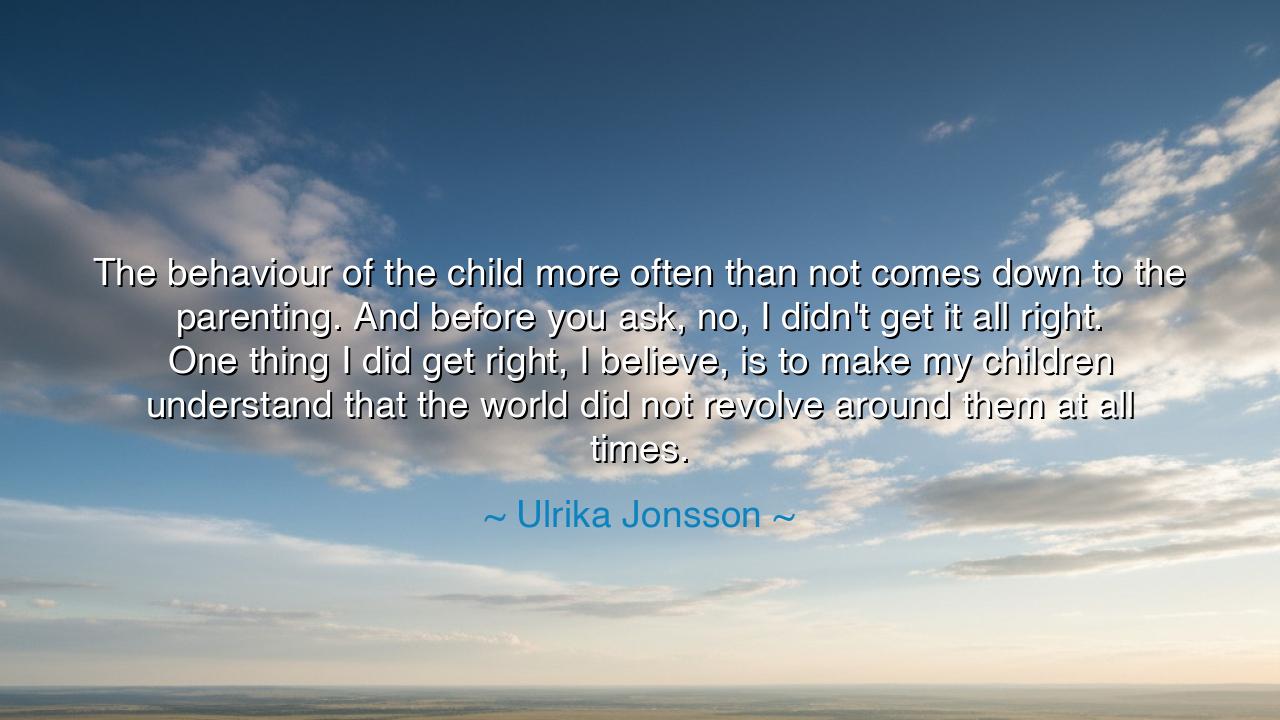
The behaviour of the child more often than not comes down to the
The behaviour of the child more often than not comes down to the parenting. And before you ask, no, I didn't get it all right. One thing I did get right, I believe, is to make my children understand that the world did not revolve around them at all times.






Hearken, O children of the generations yet unborn, and lend ear to the wisdom of Ulrika Jonsson, whose voice echoes the ancient truth that the molding of the young lies chiefly in the hands of their guardians: “The behaviour of the child more often than not comes down to the parenting. And before you ask, no, I didn't get it all right. One thing I did get right, I believe, is to make my children understand that the world did not revolve around them at all times.” In this utterance, there is both humility and insight—a recognition that the shaping of character is fraught with imperfection, yet guided by enduring principles.
The origin of Jonsson’s reflection lies in her life as a parent and observer of human nature, recognizing that the behaviors, manners, and virtues of children are not born in isolation, but are largely inherited from guidance, example, and discipline. This truth is as old as civilization itself: the elders of every age understood that the seeds sown in youth grow into the forest of adulthood, and that a mislaid lesson may shadow a life, while a well-taught principle can illuminate generations.
The meaning of her words is profound and practical. She acknowledges the imperfection of parenting, a humility rare in its clarity, yet emphasizes a central teaching: that children must learn humility, responsibility, and perspective. To make a child understand that the world does not revolve around them is to instill empathy, patience, and social awareness—qualities that sustain harmony, strengthen character, and guide the young toward wisdom. This is the legacy of effective nurture, surpassing mere discipline or reward.
Consider the life of Abigail Adams, who guided her children in the young United States with careful attention to both freedom and responsibility. She taught her son, John Quincy Adams, that his privileges came with duties, that his ambitions must honor others, and that life’s gifts demanded gratitude and humility. In this, her lessons mirrored Jonsson’s principle: behavior is shaped by guidance, and children learn most not from fear, but from understanding the world beyond themselves.
Jonsson’s reflection also carries a subtle reminder: perfection is neither expected nor required of those who nurture. The act of parenting is a path of trial and reflection. To err is human; to guide wisely is divine. Yet even amidst missteps, the truths instilled—such as the lesson that the world does not revolve around the self—serve as beacons of morality and perspective, steering children through the complexities of life.
The lesson for future generations is luminous: cultivate guidance that fosters responsibility, awareness, and humility. Recognize that your actions shape the moral and emotional compass of those who follow. Celebrate your successes and acknowledge your failures, but never underestimate the power of thoughtful, consistent teaching. A child raised to see beyond themselves grows into a citizen of the world, capable of empathy, respect, and wise judgment.
In practical life, one may embody Jonsson’s counsel by modeling consideration, accountability, and self-reflection, by setting boundaries with love, and by teaching children to respect the lives and needs of others. Encourage them to contribute, to serve, and to recognize that their desires are but one thread in the vast tapestry of human experience. These lessons, repeated through daily practice, instill resilience and virtue that endure long beyond the cradle.
Thus, O children of the future, carry this teaching as both lantern and compass: the behavior of the child is shaped by the parent, and even amidst imperfection, one truth remains sacred—that humility and awareness of the world beyond oneself cultivate character, wisdom, and enduring harmony. Teach well, guide with heart, and the echoes of your wisdom shall traverse the generations, as rivers of understanding that nourish the soul of humanity.






AAdministratorAdministrator
Welcome, honored guests. Please leave a comment, we will respond soon